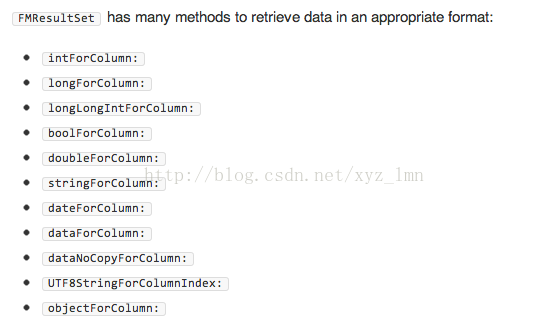FMDB的简单使用
FMDB常用类:
FMDatabase : 一个单一的SQLite数据库,用于执行SQL语句。
FMResultSet :执行查询一个FMDatabase结果集,这个和android的Cursor类似。
FMDatabaseQueue :在多个线程来执行查询和更新时会使用这个类。
创建数据库:
db = [FMDatabase databaseWithPath:database_path];
1、当数据库文件不存在时,fmdb会自己创建一个。
2、 如果你传入的参数是空串:@"" ,则fmdb会在临时文件目录下创建这个数据库,数据库断开连接时,数据库文件被删除。
3、如果你传入的参数是 NULL,则它会建立一个在内存中的数据库,数据库断开连接时,数据库文件被删除。
打开数据库:
[db open]
返回BOOL型。
关闭数据库:
[db close]
创建表:
if ([db open])
{
NSString *sqlCreateTable = [NSString stringWithFormat:@"CREATE TABLE IF NOT EXISTS '%@' ('%@' INTEGER PRIMARY KEY AUTOINCREMENT, '%@' TEXT, '%@' INTEGER, '%@' TEXT)",TABLENAME,ID,NAME,AGE,ADDRESS]; BOOL res = [db executeUpdate:sqlCreateTable];
if (!res) {
NSLog(@"error when creating db table");
} else {
NSLog(@"success to creating db table");
}
[db close];
}
添加数据:
if ([db open]){
NSString *insertSql1= [NSString stringWithFormat:
@"INSERT INTO '%@' ('%@', '%@', '%@') VALUES ('%@', '%@', '%@')",
TABLENAME, NAME, AGE, ADDRESS, @"张三", @"13", @"济南"];
BOOL res = [db executeUpdate:insertSql1];
if (!res) {
NSLog(@"error when insert db table");
} else {
NSLog(@"success to insert db table");
}
[db close];
}
修改数据:
if ([db open]){
NSString *updateSql = [NSString stringWithFormat:
@"UPDATE '%@' SET '%@' = '%@' WHERE '%@' = '%@'",
TABLENAME, AGE, @"15" ,AGE, @"13"];
BOOL res = [db executeUpdate:updateSql];
if (!res) {
NSLog(@"error when update db table");
} else {
NSLog(@"success to update db table");
}
[db close];
}
删除数据:
if ([db open]){
NSString *deleteSql = [NSString stringWithFormat:
@"delete from %@ where %@ = '%@'",
TABLENAME, NAME, @"张三"];
BOOL res = [db executeUpdate:deleteSql];
if (!res) {
NSLog(@"error when delete db table");
} else {
NSLog(@"success to delete db table");
}
[db close];
}
数据库查询操作:
查询操作使用了executeQuery,并涉及到FMResultSet。
if ([db open]){
NSString * sql = [NSString stringWithFormat:
@"SELECT * FROM %@",TABLENAME];
FMResultSet * rs = [db executeQuery:sql];
while ([rs next]) {
int Id = [rs intForColumn:ID];
NSString * name = [rs stringForColumn:NAME];
NSString * age = [rs stringForColumn:AGE];
NSString * address = [rs stringForColumn:ADDRESS];
NSLog(@"id = %d, name = %@, age = %@ address = %@", Id, name, age, address);
}
[db close];
}
FMDB的FMResultSet提供了多个方法来获取不同类型的数据:

数据库多线程操作:
如果应用中使用了多线程操作数据库,那么就需要使用FMDatabaseQueue来保证线程安全了。 应用中不可在多个线程中共同使用一个FMDatabase对象操作数据库,这样会引起数据库数据混乱。 为了多线程操作数据库安全,FMDB使用了FMDatabaseQueue,使用FMDatabaseQueue很简单,首先用一个数据库文件地址来初使化FMDatabaseQueue,然后就可以将一个闭包(block)传入inDatabase方法中。 在闭包中操作数据库,而不直接参与FMDatabase的管理。
FMDatabaseQueue * queue = [FMDatabaseQueue databaseQueueWithPath:database_path];
dispatch_queue_t q1 = dispatch_queue_create("queue1", NULL);
dispatch_queue_t q2 = dispatch_queue_create("queue2", NULL);
dispatch_async(q1, ^{
for (int i = 0; i < 50; ++i) {
[queue inDatabase:^(FMDatabase *db2) {
NSString *insertSql1= [NSString stringWithFormat:
@"INSERT INTO '%@' ('%@', '%@', '%@') VALUES (?, ?, ?)",
TABLENAME, NAME, AGE, ADDRESS];
NSString * name = [NSString stringWithFormat:@"jack %d", i];
NSString * age = [NSString stringWithFormat:@"%d", 10+i];
BOOL res = [db2 executeUpdate:insertSql1, name, age,@"济南"];
if (!res) {
NSLog(@"error to inster data: %@", name);
} else {
NSLog(@"succ to inster data: %@", name);
}
}];
}
});




